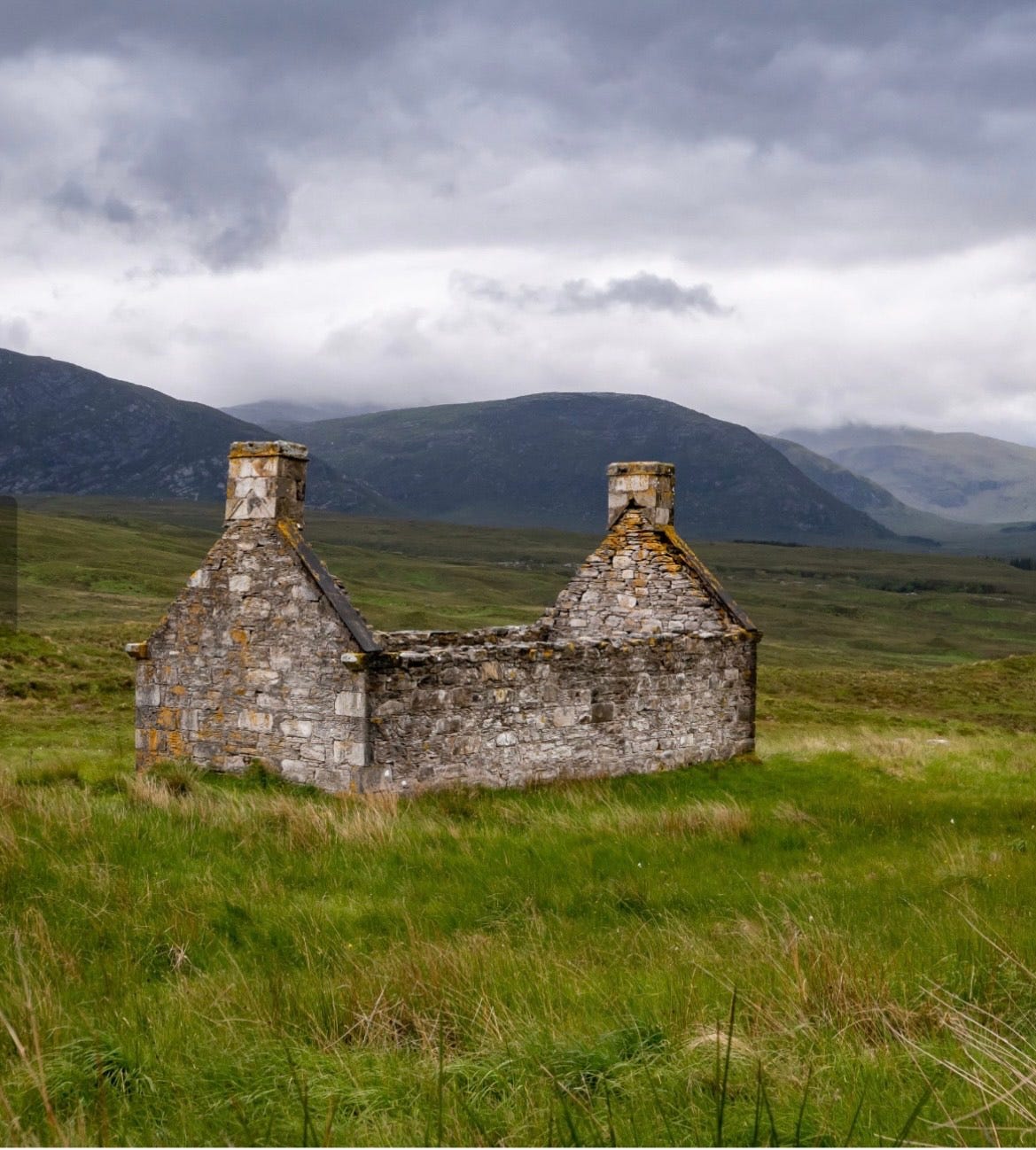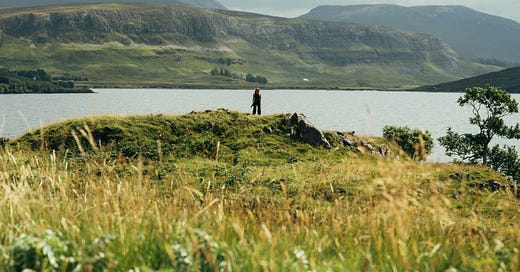I'm Digging for More Dirt from My Family's Roots
Even family trees with detailed branches don't reveal to us what we really want to know.
In less than a week, I will be standing in the Scottish Highlands. I’m headed there for the views, some hiking in the Grampian Mountains and along the River Dee, and a visit to Balmoral Castle.
Since the wedding of Charles and Di, I’ll admit it: I’ve had a fascination with that very famous and complex family history of the Windsors. Seeing their famous “vacation home,” beloved by the family since the early years of Queen Victoria’s reign, will be fascinating for me.
But the real focus of my trip is to make the connection with my own family history- perhaps not as well-known as the royals but certainly fraught with a good deal of complexity.
I know our family names going back well over 200 years: Robertson and Buick. I know the tiny town of Alyth, a little over an hour’s drive north of Edinburgh in Perthshire, was home for many generations of my family.
Thanks to sources like Ancestry.com and the very helpful Irene Robertson (half the people in this part of Scotland share this name) at the Alyth Family History Project, I’ve been able connect more branches of my family back an additional generation and have the name of a Robertson 4x great-grandfather dating back to the mid-18th century!
All of this provides me with a strong sense of my roots, and that’s why I’m so excited to follow the trail back from the U.S to Scotland and spend time in these places where my ancestors once lived.
But I still feel something missing- and this wonderful, rewarding trip I’ve been looking forward to for many years likely won’t be able to provide me any clues.
Because beyond the who and the where, and a bit about the how, I really don’t know the why in the lives of these family members.
Nothing in my online family tree or from a few stories my mother told me about her grandmother tells me why my 2x great-grandparents decided that the only way to a better future was to leave behind everything they’d ever known.
The Holes in My Family History
I’ve known since I was very young that my mother’s family were Scots who immigrated to the U.S. several generations ago. My mother was a little girl when her grandmother, Jennie, lived with my mother’s family for the last few years of her life. It was Jennie’s parents- my great-great grandparents- who sailed from Edinburgh to New York City in 1852.
My grandmother had the direct link to the generation that changed our family nationality from Scottish to American. Thus, the who and where of the people and places they came from has been well-documented.

But I can only guess as to the why. I wish I knew more of their story, their motivation for mustering up the courage to make a risky, rugged seven-week sailing across the Atlantic Ocean, buried in the depths of steerage-class (I did learn that one fact about their journey to America from a letter written by my great-aunt Nellie).
Why was this leap of tremendous faith into an unknown future their choice over any of the possible futures for them in Scotland?
For most of us who take the journey back through our roots to discover where our ancestors once lived, a huge move to a new country is usually made to escape a life of poverty or persecution. Often, it’s both of those.
I wish I had the journal pages of David Robertson or his wife (also named Jennie) to truly know what they were going through and what was happening around them in those mid-19th century years.
Did they spend years dreaming, sacrificing, and saving to make the move? Or did something catastrophic happen that made the risk of leaving their home country their only way forward?
It’s unlikely David kept a journal. The working-class people of centuries ago didn’t have the time or luxury to ponder and explore their thoughts as we do now. I have friends who’ve been lucky to get diaries from some of their ancestors, but often they are just factual accounts of events that took place during days and weeks of their lives.
I picture David and his contemporaries as the “just get on with it” mentality made famous nearly a century later in the U.K. during World War II- “Keep Calm And Carry On.”
My parents visited Alyth in the 1980s- long before invention of the great online tools I have now to at least try to put together a narrative of my ancestors’ story. My dad decided it would be funny to start telling people that the Robertsons were driven out of Alyth by the law because they were known for stealing sheep.
There’s not a shred of fact in this amusing little story he liked to tell at parties to get a laugh. But this is how- lacking the story of “why” from the original source- family history can get so distorted, and myths turn into reality over generations.
Naturally, my son heard his grandpa tell the story when he was a child. If I hadn’t dug around and found out more about the family to dispel the myth, he may have believed it was true. Then he’d keep passing it on to future generations.
Filling In Missing Puzzle Pieces
I can only put together what I learn from the history of this area in Scotland to surmise that that my 2x great-grandfather saw no future in his chosen occupation: farming.
I’m a big fan of the PBS show, Finding Your Roots. Host Dr. Henry Louis Gates often presents his famous guests with potential narratives based on historical events to fill in the missing whys in the stories of their ancestors.
Doing my own research using just Google searches (alas, “Skip” Gates and his team were not available to me), I learned that Scotland also suffered a famine during the same period of the deadly famine that decimated Ireland in the 1850s.
I also learned of what’s called “The Highland Clearance,” where landowners essentially drove tenant farmers from their lands to increase their profitability through raising and grazing sheep. This “clearance” began several decades before David Robertson made his decision to leave his home country.
I really can’t say for certain at what rung of the rural 18th- and 19th-century Scottish farming ladder my ancestors were, but I can say with strong certainty they weren’t the titled landowners. They were likely farmers on a rented parcel of land called a “croft,” which had a small home and an opportunity to make a living and build a family.
The magnificent Glamis Castle is just over ten miles from my Scottish hometown of Alyth. The castle dates back 650 years and is famous as the inspirational setting for Wiliam Shakespeare’s Macbeth and as the birthplace and childhood home of Elizabeth Bowes-Lyon, who would become Queen Elizabeth, the Queen Mum.
Did my Robertson and Buick ancestors farm the land owned by the family of a future Queen? That would explain so much about my fascination- as an American- with the British royal families.

Did young David Robertson see his father and father-in-law suffer the loss of what was once their livelihood in farming, and this motivated him to begin a plan to ensure he could create a better future for himself? Perhaps getting married in 1844 created the desire in him to want more for his family, and he spent the next decade, year by year, taking actions that would make his dreams a reality.
This could be the “why” for 33-year-old David and his 27-year-old wife Jennie to move their family from Scotland to the U.S. They may have seen it as their only chance to get their own piece of land and for David to work as a farmer without fear of his land being snatched away.
After arriving first in New York City in 1852, the young Robertson family moved to northwest Michigan, where David was able to purchase land and farm. They created a homestead near Newaygo, where he and his wife grew their family to four children.
Leaving Behind a Tree with Transparent Roots
I like the outcome for David and family, the “happy ending” to their immigration story.
They found what they appeared to be looking for, but I know theirs was still a hard-working life, creating that homestead,
That deep desire to have land that was theirs had to have kept them going during difficult times. There was no going back, only pushing ahead forward.
I wish I knew more about the smaller daily life details of my ancestors, and the hundreds of little decisions they made that changed the course of their lives- and mine.
Maybe I’m leaning toward the combination of meager facts from my family history and actual history to create a story for David and his family because I relate so very much to his strong desire to pursue a life of his choice.
Did I inherit a bit of his Scottish grit and perseverance as I’ve made my own leap of faith decisions over the decades to pursue work that’s rewarding and allows me a feeling of authenticity and creative freedom?

Reflecting on David’s story, am I able to close the loop on some of my own whys by connecting with a family member who may have shared my mindset more than 150 years ago?
It really inspires me to think so. It also puts in perspective what I call hard work and facing obstacles to achieve my dreams when I think of what David and Jennie overcame to pursue the life of their dreams.
I’m thankful that I have a very detailed family tree to pass on to my son, and his children will have the facts of their heritage- the Scottish, English, Irish and German roots. But I’m going to do them a favor and leave behind more of the whys that, as they grow older and more reflective, they also might become more curious about.
My 31-year-old son has just begun to show an interest in my whys- last year he bought me a book titled, “Mom, I Want to Hear Your Story.” I was very touched by his interest in knowing more than just a timeline of my who and what.
I’m so glad he’s given me the nudge to tell him why.
While our Boomer generation isn’t as tight-lipped as our parents about some of the hard or even controversial decisions that changed the direction of their lives and ours, being honest about our choices and actions isn’t easy.
We may not be the over-sharers that our kids are, but we’ve come a long way from the generations before us that didn’t have the luxury of reflection and too often preferred to keep secrets and cover up whys.
It’s time we dug deeper and revealed more about why we are as we leave a legacy. Are you ready to reveal more than just your branches and leaves to the generations of family following you?





I hope your travels give you some answers and connections to the generations before you.
I love this post and I was actually considering sending some of those books to my parents as well as my children so that they could tell their stories too. I’d also like to tell my story. I want my children and their children to know who I was and why I did what I did, what drove me and motivated me and what my idea of a perfect happy ending would be to my story.